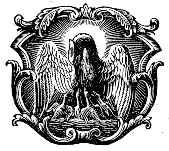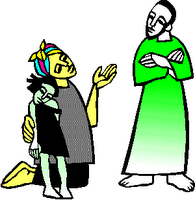
|
Mother Pelican
A Journal of Sustainable Human Development
Vol. 6, No. 11, November 2010
Luis T. Gutierrez, Editor
|
|
|
|

|
|
|
The First Woman Priest
José Ignacio González Faus, SJ
Professor of Theology
University of Barcelona, Spain
Original in Spanish:
La Primera Presbítera,
Periodista Digital/Miradas Cristianas, 11 October 2010
English Translation by
Iglesia Descalza, 12 October 2010
Reprinted with Permission
|
NOTE BY THE EDITOR
This article is a futuristic tale of an encounter imagined by the Spanish Jesuit theologian, José Ignacio González Faus. It is based on the the story of Jesus and the Syro-Phoenician woman (Mark 7.24-30).
The relevance of this work in a journal of sustainable development may not be obvious to some. However, given that human development is the core of sustainable development, and given that human development must happen in a concrete cultural context, the enormous influence of religion on human culture and the "collective subconscious" cannot be ignored. It is hard to imagine that the persisting refusal of some religious institutions to have women in roles of religious authority is irrelevant to human culture and, therefore, irrelevant to human development, now and in the future.
The author is a Roman Catholic priest and reflects the Vatican's position that women cannot be ordained; thus the title The First Woman Priest. However, women are already being ordained in other Christian churches, and assuming leadership roles in other religious institutions.
|
 The
story is confusing because, before it happened, Earth had been almost
wiped out, it is unclear whether by nuclear war or an unprecedented
environmental disaster, through which a lot of documentation was lost.
But the indisputable fact is that, halfway through the 22nd century, the
Catholic Church agreed to ordain women to priestly ministry. The first
to ordain them was a pope who, according to some, was called Paul and,
according to others, Peter. There is a lack of documentation about this.
The
story is confusing because, before it happened, Earth had been almost
wiped out, it is unclear whether by nuclear war or an unprecedented
environmental disaster, through which a lot of documentation was lost.
But the indisputable fact is that, halfway through the 22nd century, the
Catholic Church agreed to ordain women to priestly ministry. The first
to ordain them was a pope who, according to some, was called Paul and,
according to others, Peter. There is a lack of documentation about this.
But
what is known is that, at that time, a Syro-Phoenician woman approached
the Pope on his trip to Palestine. It was easy to do so, because after
the disaster to which we alluded, popes no longer traveled like heads of
state surrounded by an army of bodyguards. It was a serious risk, but
the popes of that time accepted it to become more like Jesus. And they
traveled almost incognito, concerned above all to see and hear the
faithful rather than be seen and heard, because the latter was now very
easy due to the the incredible progress of the media at that time.
The
Pope knew that he was traveling to a region where Christianity was a
minority faith in a difficult situation, cornered by a
Jewish-Palestinian conflict which was still alive after centuries. But
he wanted to learn about the problems of those Christians and support
them in their difficult faith.
The Syro-Phoenician woman (whom
others call "Canaanite" by analogy with the Gospel of Matthew 15:21 ff)
was a believer from head to toe who had struggled to keep her faith
alive and nurture it amid the difficulties of her environment. She had
studied theology in spite of opposition from her bishop. But she was shy
and had to pray and work up the courage to approach the Pope and say
that she wanted to ask a favor of him, a very gospel one according to
her.
The Pope smiled and with all his ability to be welcoming, asked her:
"Woman, what do you desire?"
"Your
Holiness, I think that for the good of the Gospel and the Church, you
should proclaim as soon as possible that women can be allowed to
minister in the Church."
The Pope's face was troubled for a
moment. Trying to keep a smile on his lips but with a touch of severity
in the eyes, he replied:
"Jesus Christ only called men to the ministry. So therefore, what Christ gave to men, we don't give to women."
"Yes,
brother Peter. But Jesus also taught that Mary had chosen the better
part and it would not be taken from her. Without that better part,
Martha's service only breeds resentment and complaints. While, if one
has gone through being like Mary, then one doesn't remain there but is
happy to return to being like Martha, as did the Lord when He washed the
feet of His own. I believe that there is no good Martha unless she is
born of Mary, nor is there a real Mary that does not lead to becoming
 Martha. No good service is born without contemplation, no genuine
contemplation fails to turn into service. Ecclesial ministry is service
rather than an honor, therefore it would be good for women to be
involved in it -- to help, so that the ministers of the Church are not
only grumpy and complaining Marthas... "
Martha. No good service is born without contemplation, no genuine
contemplation fails to turn into service. Ecclesial ministry is service
rather than an honor, therefore it would be good for women to be
involved in it -- to help, so that the ministers of the Church are not
only grumpy and complaining Marthas... "
"I see you have faith,
woman," the Pope replied. "But I can not use the power that Christ gave
me according to my whim. I have no more power than what the Lord gave
me. "
"Yes, Your Holiness. You have no more power than Peter did.
But Peter did not think he was disobeying the Lord by going to preach
to the gentiles, despite such a clear statement of the Master ("I was
sent only to the lost sheep of the house of Israel"). Neither did Peter
excommunicate Paul, the revolutionary and annoying upstart, but instead
listened to him, because he understood that the service which had been
entrusted to him was not to do exactly the same thing as Jesus had done
in the past, but to do what Jesus would do in each new present
situation. That is why the Lord promised him His Spirit, and that
promise is in effect for you too."
Upon hearing her, the Pope was
deeply moved. He closed his eyes and after a pause, replied: "O woman,
great is your faith! Let it be as you wish, for if the Lord allowed
Himself to be corrected by the faith of a woman, I do not want to think
that I am incorrigible."
And then and there, he laid hands upon her and said: "Receive the Holy Spirit."
The
woman went away, even more moved than the pope. Actually, she was not
seeking the priesthood for herself. She had read that back in the 20th
century (circa 1965), at a meeting of the journal Concilium in
which the issue had come up for almost the first time, and with somewhat
twitching impatience, a young Canadian theologian had approached the
microphone to say: "I don't think that we will liberate women by
imposing the alienation of men on them." But she expected that the entry
of women into church ministry would free a lot of priests from
perverting their vocation into a career, to turn it into real service.
At least in the beginning. Then the human makeup is the same in all, and
temptations to prominence will arise in both men and women. But then the
Holy Spirit would take care of seeking solutions through a deep reform
of church ministry.
|Back to ABSTRACT|
Page 1
Page 2
Page 3
Page 4
Page 5
Page 6
Page 7
Page 8
Page 9
Supplement 1
Supplement 2
Supplement 3
PelicanWeb Home Page
|
|
|
|
"True knowledge exists in knowing
that you know nothing."
Socrates (469 - 399 BCE)
|
|
Page 4
|
|
FREE SUBSCRIPTION
|
![[groups_small]](groups_small.gif)
|
Subscribe to the
PelicanWeb's Journal of
Sustainable Development
via the Solidarity-Sustainability Group
Enter your email address:
|
|
|
|